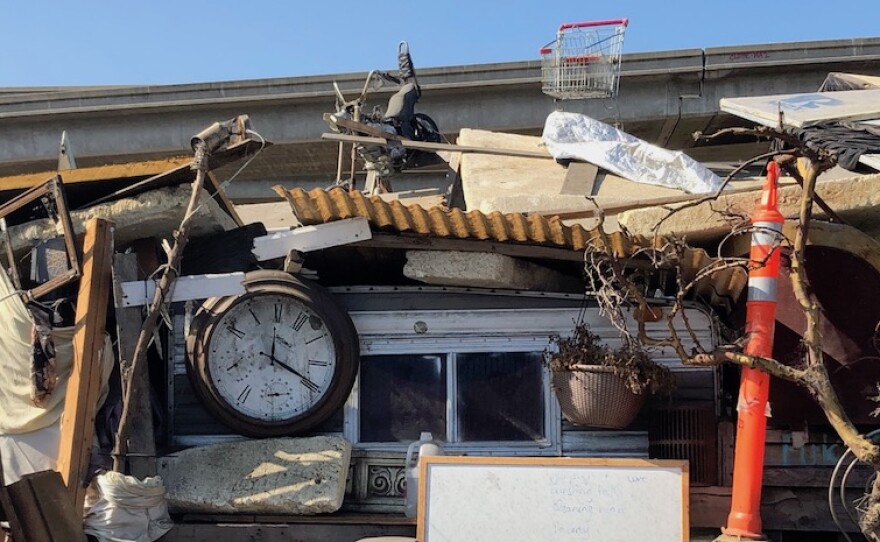It’s around 11 a.m. on a Saturday morning at the 2200 block of the Wood Street homeless encampment in West Oakland.
I’m here because I want to find out whether at least some of the city’s estimated 4,000 homeless people will vote. There’s a lot at stake for them this year.
For example, there’s a sales tax measure designed to fund homeless services in Alameda County. There’s also a state proposition that would allow cities to enact rent control.
I find Tina Harvey, a resident, standing outside the pink van she lives in. Like everyone else in Oakland, she’s fed up with the piles of trash in her adopted city.
On this street, there’s piles of abandoned furniture, clothes and other junk.
“I just I'm tired of the rats, I can't stand them. And it's like, everybody under the sun starts dumping over here. I mean, they see one person doing it, so they figure everybody can do it.,” she tells me.
I ask her whether she knows about Measure RR on the Oakland ballot. If passed, it could increase fines for people who dump trash on the streets — including near Harvey’s van.
She responds: “No, I didn’t. But thank you for letting me know!”
She does plan to vote this year. She does every election. She’s 49 years old, and she’s been homeless for the past 7 years. She gets her ballot mailed to her dad’s house in San Pablo.
“Ever since I was legal age to vote, I've been voting. They’re gonna follow through or not, one way or another, but at least my, my opinions can be heard,” she says.
She’s in favor of Alameda County’s Measure W. It’s a proposal to raise 150 million dollars a year for homeless services.
But many of Oakland’ residents wonder if these funds will actually go to the right place. “We're going to have to watchdog this thing like crazy. Can we make sure that the money doesn't all get sucked up by consultants and bureaucrats and ensure that some of it actually hits the street? You know, that actually assists homeless people?”
That’s Naomi Schiff. She’s part of a local homeless advocacy group called ShelterOak.
It recently helped to block efforts to siphon off budget money meant for the homeless to the police.
In Tina Harvey’s case, she is in the minority of homeless people who do cast a ballot.
The National Coalition For The Homeless reports that across the country, only 10 percent of the homeless vote.
To find out more about local unhoused voters, I called Alastair Boone. She’s the editor-in-chief of Street Spirit, a homeless advocacy newspaper in Berkeley.
In the past month, Boone surveyed more than 100 homeless people in the East Bay. Just over a half said that they aren’t voting.
Boone says: “Voting is in fact, on the minds of unsheltered people — or at least the ones who I spoke to. They're choosing not to vote not because they don't care, but because they just don't feel equipped to do so.”
For many, logistics to vote are tough, and everyday survival is a major priority.
“A lot of people also said they didn't want to vote because being homeless was kind of a full time job. And they just didn't feel informed enough about the candidates running to vote,” Boone says.
The pandemic has made it even harder for homeless people to read up on the issues and candidates — especially since libraries are closed.
But there are efforts to make things easier.
Alameda County’s Health Care Services Agency serves more than 3,000 homeless people.
Here’s the agency’s David Modersbach:
“We help people get access to mailing addresses, because you need a mailing address to be able to register to vote.
In addition, they’re doing Zoom presentations about what’s on the ballot and handing out a non-partisan voter-guide. The agency usually does these presentations in person, but the pandemic cancelled those activities.
“We just try to get information out there, get resources out there to help give the opportunities for people experiencing homelessness to be able to exercise their their right to vote,” Modersbach says.
Even the Oakland A’s baseball team is pitching in. It's donating bus passes with directions to help the homeless get to voting locations. That gives people a last minute opportunity to vote.
Advocates like Naomi Schiff say the homeless are more likely to get involved if they’re given more opportunities, even outside of the polls.
“You want to include them in decision making because they will be useful. And it also trains people's muscles for independence,” she says.
She points to Opportunity Village in Eugene Oregon as one potential housing model. There, the city leases property to a nonprofit that runs villages of small homes. And it’s the residents -- not landlords -- who have governance responsibilities.
This arrangement is just one idea that could help people like Tina Harvey, as leaders seek solutions in the Bay Area.
For a list of accessible voting locations, where you can register to vote and cast a provisional ballot go here.
In California, you can also track the status of your ballot, and whether it has been counted. Go here.
















